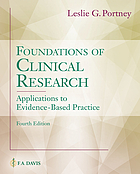
"If I had an hour to solve a problem and my life depended on it, I would use the first 55 minutes determining the proper questions to ask."
(Incorrectly attributed to Albert Einstein in many forms, but makes the point)
When starting a research project, we recommend that you bear two definitions in mind:
It is important to have a good grasp of the literature on or around your research topic early on in the process. For that, you will want to review the studies and papers that have already been published on or around your research questions. Your research questions are translated into search queries that will be used in databases such as Ovid MEDLINE or PubMed, Embase (Ovid), CINAHL (EBSCOhost), Web of Science Core Collection, or Scopus -- to name but a few options.
There are two types of clinical questions that are often discussed in evidence-based practice in health sciences: Background questions and foreground questions. It is useful to keep this in mind given much of the literature on question formulation is based on frameworks, such as PICO, related to clinical questions.
Question formulation frameworks are often used to determine the key concepts of your research question -- that is, when searching the literature, which elements of your question should be used as terms in your search query?
PICO (Patient/Population - Intervention/Exposure - Comparison - Outcome) is a commonly used question formulation framework in Health Sciences. It works best for questions about interventions or exposures.
If you are asking a clinical question, you might consider formulating your question using the PICO model.
PICO is an acronym used to describe the four elements of a good clinical foreground question:
This video by the Yale Medical Library provides an overview on how to formulate answerable questions using the PICO format, applied in the context of searching a database on the Ovid platform (at McGill, this platform is used to search MEDLINE, Embase, Global Health, APA PsycInfo, and more).
Harvey Cushing/John Hay Whitney Medical Library. Formulating your questions using PICO. https://library.medicine.yale.edu/tutorials/753
Your research project may include a systematic review, scoping review, or other knowledge synthesis. These reviews have their own methodologies and normally involve systematically searching the literature in a thorough, transparent, and reproducible way. You will want to formulate a review question when conducting such reviews.
Systematic searching can also be used as a technique to search the literature in general.
 Foundations of Clinical Research : Applications to Evidence-based Practice by Leslie G. Portney
Foundations of Clinical Research : Applications to Evidence-based Practice by Leslie G. Portney
McGill Libraries • Questions? Ask us!
Privacy notice